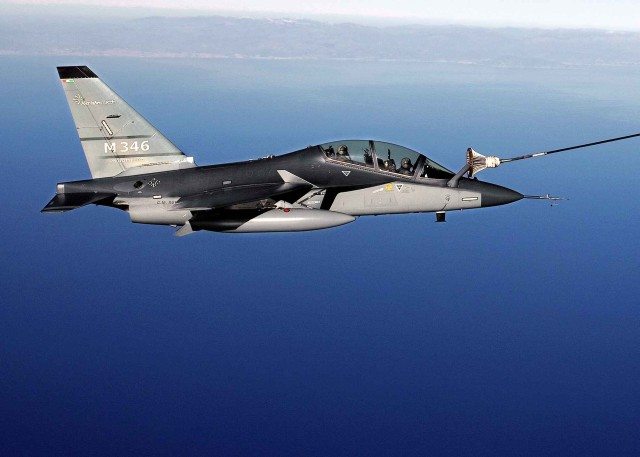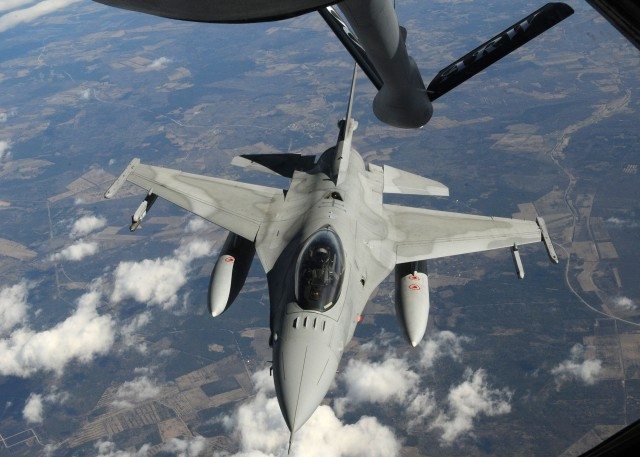France: With the Republic of Singapore Air Force’s (RSAF’s) new advanced jet trainer Alenia Aermacchi M-346, fighter pilot trainees can now train in more realistic air combat environments, handle sophisticated systems early in their training, and be better equipped for fighter operations.
The RSAF marked a milestone in its transformation of flying training as it inaugurated the M-346 aircraft into 150 Squadron (SQN) on 3 Sep at Cazaux Air Base in France. Minister for Defence Dr Ng Eng Hen, who officiated at the inauguration ceremony, highlighted the enhancements to the quality and realism of the RSAF’s fighter flying training that the M-346 aircraft has brought about.
“The M-346 – its aerodynamic performance, excellent handling qualities and modern avionics systems – allows our pilots to be better trained,” he said, adding that the advanced jet trainer stood out from its predecessors because it could expose pilot trainees to realistic operational environments at the early stage of their training.
Acquired in 2010 as part of the RSAF’s Advanced Jet Trainer replacement programme to replace the A-4SU Super Skyhawk, the M-346 aircraft replicates the flight performance and avionics of advanced modern-day fighter aircraft. The RSAF took delivery of the first aircraft in 2012. To date, it has received the full fleet of 12 M-346 jet trainers.
Noting that the global industry of fighter planes was undergoing revolutionary technological change, Dr Ng said the introduction of the M-346 aircraft was timely as it would enable a smooth transition from the advanced fighter jet trainers to the actual fighter aircraft.
On the capabilities which the M-346 aircraft brings to the RSAF, Commanding Officer 150 SQN Lieutenant Colonel (LTC) Kelvin Wan said: “The M-346 aircraft helps to enhance pilot training by introducing advanced combat skills at an earlier stage of training. Skills such as radar employment, Beyond-Visual-Range missile engagements and precision weapons delivery are all possible now, with the M-346 aircraft.”
At the inauguration ceremony, Dr Ng also commended the air and ground crew of 150 SQN for their competence and dedication, which were evident in their recent achievements. In February, the squadron became the first in the world to operationalise the M-346 aircraft for its ab-initio (starting from scratch) aircrew training. In March, it produced the first pilot trainee in the world to fly solo on the advanced jet trainer. Maintaining high safety standards, the squadron achieved its first 1000 accident-free hours on the M-346 aircraft in June. In the same month, 150 SQN participated in the Cazaux Air Show with a combined aerial fly-past of three M-346s with the French Alpha jets.
Sharing his thoughts on being the first pilot trainee who flew solo on the advanced jet trainer, Lieutenant (LTA) Pan Shang Hua said: “I’m definitely proud and honoured to be the first student pilot to fly solo on the M-346.”
“I think it reflects very well on the confidence that the RSAF has in the aircraft, as well as the confidence the instructors have in me.”
The inauguration of the M-346 aircraft into 150 SQN also marked the significance of the RSAF’s overseas training in honing its operational readiness and professionalism, and in enhancing bilateral defence ties with the host country. The RSAF’s training in France began in 1998, and both air forces agreed in 2011 to extend the Cazaux detachment to 2035.
Dr Ng, who is in France for an introductory visit, also met French Minister of Defence and Veterans Affairs Jean-Yves Le Drian, and visited the French Analysis Centre for Defensive Cyber Operations.











